I did a lot of Generative AI reading in 2023, and also a lot of business and non-fiction books. Reflecting on what I read, none of these books were as good as my perennial “Top 5” non-fiction books.
These are the books that I re-read and learn something new every time.

“The Lean Startup” by Eric Ries
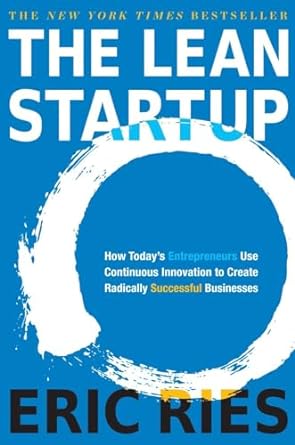
Startups Must Adapt and Adjust Quickly
In the dynamic world of startups, adaptability is more than a buzzword; it’s a survival strategy. Eric Ries emphasizes the importance of being agile and responsive to changes in the market. This approach allows startups to pivot when necessary, ensuring that their journey is guided by practicality and real-world demands.
Validate Business Ideas Through Customer Feedback
Ries advocates for a customer-centric approach to business development. By engaging with customers early and often, startups can validate their ideas and refine their products based on real feedback. This process helps in building a product or service that genuinely resonates with the market.
Focus on a Minimum Viable Product for Early Testing
The concept of a Minimum Viable Product (MVP) is central to Ries’ philosophy. By launching with just the essential features, startups can test their hypotheses quickly and cost-effectively. This approach not only saves resources but also accelerates the learning process about what works and what doesn’t.
Continuous Innovation is Key to Long-term Success
Innovation isn’t a one-time effort; it’s a continuous process. Ries encourages a culture of constant innovation, where learning and adapting become integral parts of the business model. This mindset helps companies stay ahead of the curve and maintain their relevance over time.
“The Innovator’s Dilemma” by Clayton M. Christensen
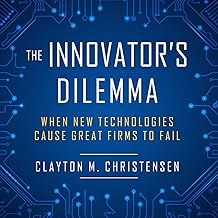
Companies Can Fail Despite Good Management if They Ignore Disruptive Technologies
Christensen’s landmark concept is a warning against complacency. Even well-managed companies can falter if they fail to recognize and adapt to disruptive technologies. It’s crucial to stay alert to technological advancements and how they can reshape industries.
Disruptive Technology Often Initially Underperforms but Improves Rapidly
A key insight from Christensen is that disruptive technologies may not seem impressive initially. They often start as underperforming, cheaper alternatives to existing solutions but can quickly evolve and dominate the market. Recognizing these potential game-changers early is vital.
Invest in Emerging Technologies, Even if They Don’t Meet Current Customer Needs
One of the bold suggestions from Christensen is to invest in technologies that may not immediately meet current market demands. This forward-thinking approach can position companies to leapfrog into the future, catching waves of innovation before they become mainstream.
Organizational Structures Can Impede Recognizing and Responding to Disruptive Change
The way a company is organized can significantly affect its ability to respond to disruptive changes. Rigid, hierarchical structures might hinder the quick decision-making and flexibility needed to embrace new technologies. Christensen urges a reevaluation of organizational structures to foster agility.
“SPIN Selling” by Neil Rackham
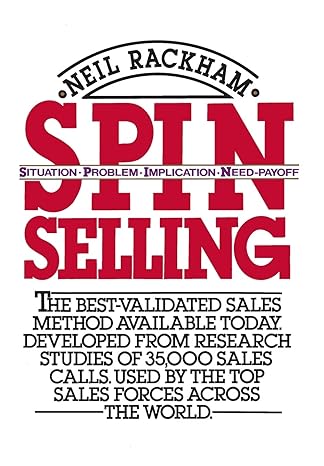
Successful Selling is About Asking the Right Questions
Rackham revolutionizes the concept of selling by focusing on the ‘SPIN’ technique—Situation, Problem, Implication, Need-payoff. It’s not just about pushing a product, but about understanding the customer’s needs through the right questions.
Understand the Customer’s Situation
A deep understanding of the customer’s situation is crucial. This involves listening more than talking and gaining insights into their challenges and goals. A seller who understands the customer’s context can offer more tailored and effective solutions.
Focus on Problem-solving, Not Just Product Features
The essence of effective selling, according to Rackham, is to concentrate on solving the customer’s problems rather than just showcasing product features. This shift in focus from product to problem-solving creates value for the customer, leading to more successful sales.
Tailor Your Sales Approach to Each Customer
A one-size-fits-all approach doesn’t work in sales. Rackham emphasizes the importance of customizing the sales approach to fit each customer’s unique needs and circumstances. This personalized approach builds stronger relationships and more successful sales outcomes.
“Getting Things Done” by David Allen
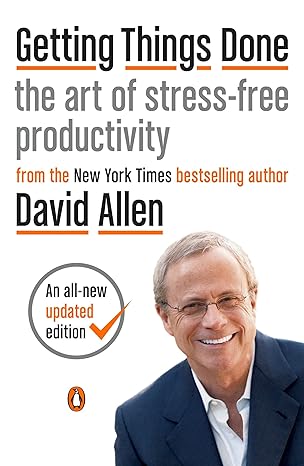
Organize your tasks and thoughts neatly.
Allen stresses the importance of having a clear and organized system for managing tasks and thoughts. A well-structured system helps in reducing stress and increasing productivity.
Do one thing at a time and focus.
The book advocates for focusing on one task at a time. Multitasking often leads to decreased efficiency and quality of work. Concentrating on a single task ensures better execution and results.
Make a list and keep track easily.
Keeping a list is a simple yet effective way to manage tasks. It provides a visual representation of what needs to be done, making it easier to prioritize and track progress.
Take action steps calmly and step by step.
Allen suggests breaking down tasks into smaller, manageable action steps. This approach allows for a calmer and more systematic progression through tasks, leading to less overwhelm and more accomplishment.
“The 48 Laws of Power” by Robert Greene
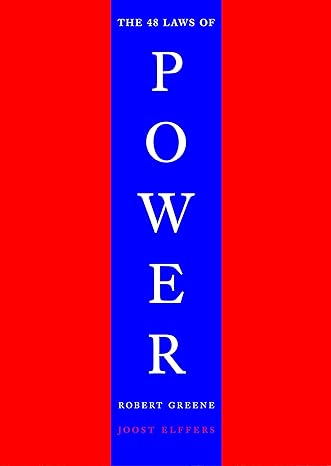
Power requires careful strategy and planning.
Greene’s book delves into the intricate and often underhanded world of power dynamics. He suggests that acquiring and maintaining power requires strategic thinking and meticulous planning.
Learn to be subtle and indirect in your influence.
One of the key lessons from the book is the art of being subtle and indirect in exerting influence. This approach can be more effective than overt power plays, which can be met with resistance.
Reputation is incredibly important; protect it.
Greene places a high value on reputation, viewing it as a cornerstone of power. He argues that protecting and enhancing one’s reputation is vital in the game of power.
Use absence to increase respect and honor.
The book discusses the paradoxical power of absence – being unavailable or scarce can increase one’s respect and value in the eyes of others.
Master the art of timing in your actions.
Timing is everything, according to Greene. The ability to gauge the right moment to act is crucial in maximizing the impact of one’s actions in the pursuit of power.

Experienced Machine Learning, Artificial Intelligence, Data Strategy, Information Technology, and Shared Services Executive
Things that matter:
• five largest ML models created at P&G, with over 10,000 pipeline runs/year
• initiated and operated THE data labeling platform and services for ML at P&G, with 300+ projects and millions of annotations on the platform
• Generative AI strategy for the Global Business Units Shared Services for the Brand, R&D, Manufacturing, Supply Chain, Master Data + eComm functions
• Product Management leadership for enterprise-wide Cloud applications combining data and AI
Education
Harvard Business School Executive Education: Artificial Intelligence (Competing in the Age of AI).
Northwestern University: Executive Strategies to Unlock Enterprise Value in Artificial Intelligence
University of Bucharest: Master of Computer Science from the Faculty of Mathematics
CIIM – Master of Business Administration (MBA) with a focus on Finance
Key Certifications:
AWS Certified Machine Learning – Specialty
Azure ML Artificial Intelligence Certification
Data Camp Certified Data Scientist (Python Track)




